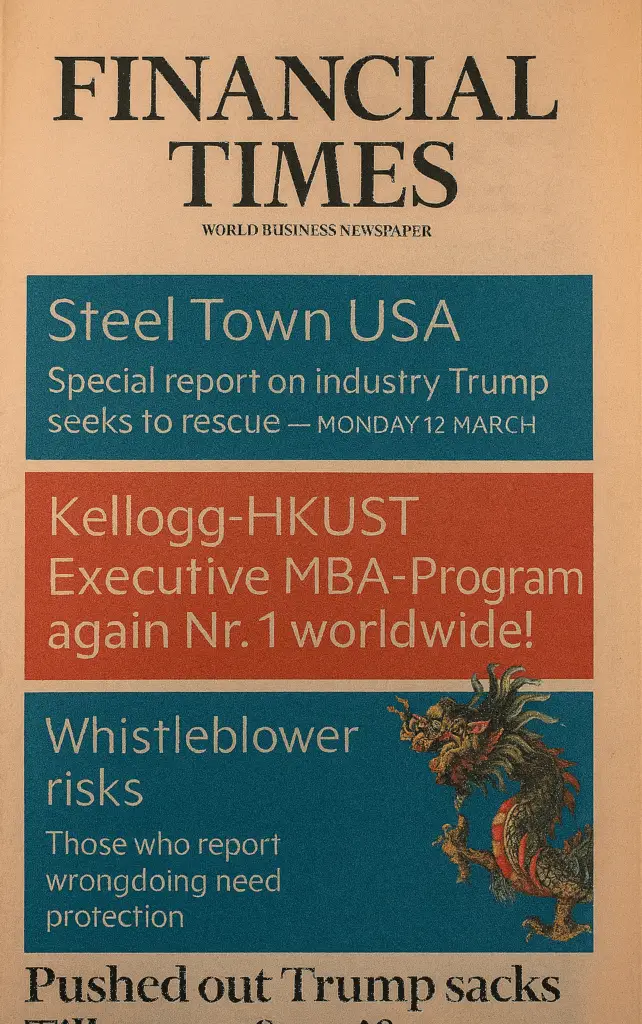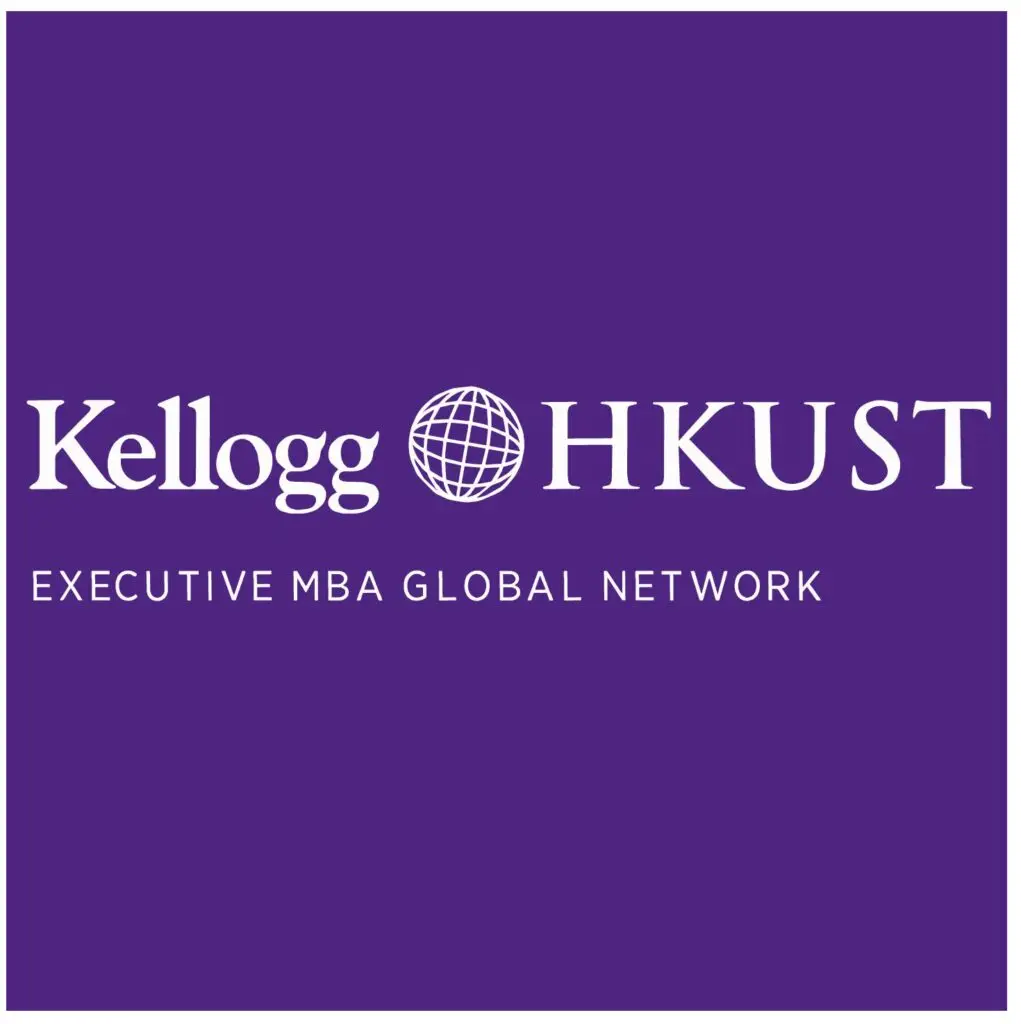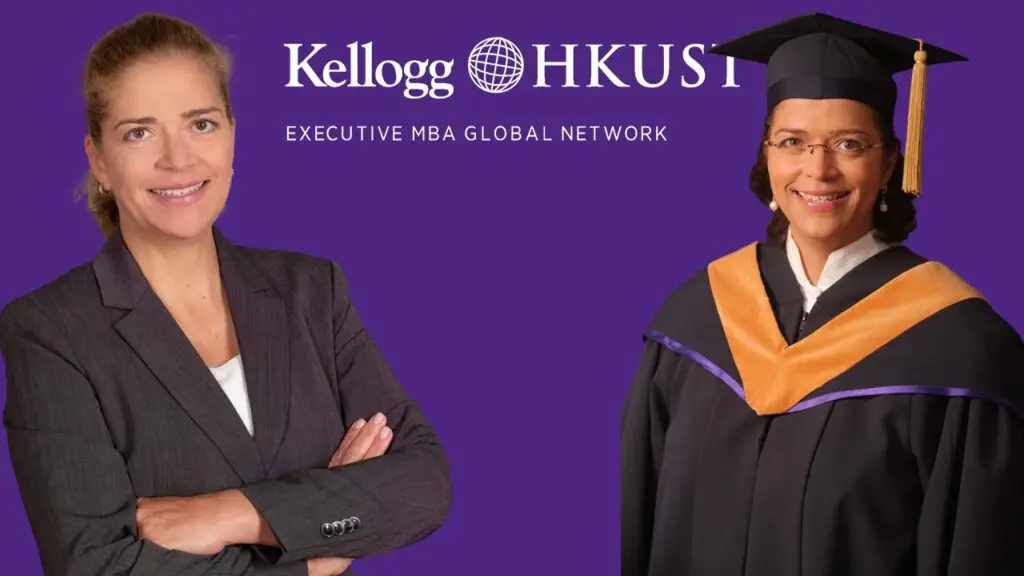
Financial Times
Kellogg-HKUST Executive MBA Program
Contact details: Renate H. Sattler
Phone: +49 151 28841087
E-mail: rs@sattlerinterim.com
Why the Kellogg-HKUST Executive MBA is No. 1 worldwide according to the Financial Times!
According to the Financial Times, the Kellogg-HKUST Executive MBA (EMBA) program at the Hong Kong University of Science and Technology has been the world’s leading Executive MBA program for years. It is unparalleled in its continuous top position: no other EMBA has been able to maintain its position at the top of the Financial Times ranking so often and so confidently. But what are the reasons for this extraordinary success story, and why does this program in particular enjoy such a high international reputation?
The answer to this is multi-layered and intertwined: it is due to unique structural, content-related and cultural factors, consistent quality assurance, global orientation, alumni success, innovative strength and the high credibility that comes with a top position in the Financial Times ranking.
The importance of the Financial Times Ranking
The Financial Times as a benchmark
The Financial Times ranking is the globally recognized gold standard for evaluating Executive MBA programs. The Financial Times uses comprehensive, transparent and regularly updated evaluation methods based on over 20 criteria. These include in particular
- Average income and salary development of alumni (highest weighting in the ranking)
- International diversity of faculty and students
- Qualification level of teaching staff (proportion of academics, research performance)
- International mobility, course experience and networks
- Gender diversity
- ESG relevance (sustainability) and degree of innovation
- Alumni satisfaction and career boost
The Financial Times Ranking has a high level of authority in international management education and enjoys the trust of companies, graduates and universities worldwide.
Weighting and methodology at the Financial Times
The Financial Times only awards around 31% of the ranking for salary and salary increase after graduation. Other key factors are “value for money”, “career progression”, “international experience” and “diversity”. Submitted data is carefully reviewed, alumni are interviewed directly, and the data is legitimized through external audits – which has been confirmed time and again for the Kellogg-HKUST program, for example.
Global top performance: The success factors of the Kellogg-HKUST EMBA
Salary impact & career turbo
According to the Financial Times, the Kellogg-HKUST EMBA consistently delivers the highest or second-highest salary jump worldwide, with alumni earning an average annual income of over $650,000 three years after graduation. This is an increase of 80-90% compared to the income level before the start of the program – an unprecedented figure.
These salary increases are key criteria in the Financial Times ranking and signal the direct value of the degree for career development. Career progress goes far beyond salary: many alumni take on global C-level positions after graduation, set up new companies or are responsible for major international projects.
Internationality and diversity
The program brings together participants from more than 30 countries and creates a globally unique, multicultural learning environment. Internationality is a key indicator of the Financial Times, and the Kellogg-HKUST EMBA scores with:
- Faculty members from West and East (Kellogg and HKUST)
- International guest lecturers
- “Global Network Weeks” with partner universities on four continents
- Students from different sectors, nationalities and genders
This extraordinary diversity promotes cultural exchange and optimally prepares participants for the globalized business world – a key aspect that the Financial Times includes in its assessment of the world’s best programs.
Faculty, research and innovative strength
The teaching team consists of internationally renowned professors who not only communicate the latest research findings, but also actively shape them. In the Financial Times ranking, the research performance and qualifications of the faculty (proportion of doctorates, publication activity) play a particularly important role.
- The professors teach at both partner universities and implement state-of-the-art management knowledge – from both a Western and an Asian perspective
- Curriculum development is always geared towards the latest market trends and global challenges
Curriculum & contents: Bridge between East and West
The curriculum addresses both traditional management issues and current topics such as digitalization, ESG, sustainability, entrepreneurial leadership and international governance. It has been specifically designed so that participants get to know and navigate the strategic and cultural dynamics on both the Asian and Western sides.
The international group work, an intensive launch week and block events at several locations (such as HKUST in Hong Kong and the Kellogg School in Chicago) strengthen the sense of community, the transfer of experience and the participants’ network.
Alumni network and long-term success
The network of graduates from both partner institutions comprises around 130,000 people worldwide. The Financial Times regularly surveys alumni for its ranking and surveys their subjective satisfaction and the performance of the network as a separate quality dimension.
Kellogg-HKUST alumni confirm this time and again:
- A sustainable career boost
- Access to exclusive management levels and international markets
- Lifelong commitment to a community of decision-makers
- Enormous satisfaction with the program (e.g. 9.6/10 points in the Financial Times survey in 2023)
Reputation and consistency in the Financial Times ranking
The Kellogg-HKUST EMBA has been ranked first in the Financial Times around a dozen times in 20 years – a record that no other Executive MBA program can boast. The repeated top ranking is recognized by international media, companies and decision-makers as the highest quality rating.

The role of the partnership: Kellogg & HKUST
The strategic cooperation between the Kellogg School of Management (Northwestern University) and HKUST is a symbol of global academic excellence:
- Both institutions are among the world’s top schools for business, management and innovation
- The joint responsibility for teaching quality, development and selection of candidates guarantees the highest standards
- As the first EMBA program of its kind in Asia, a trend was created that was imitated – but remains unrivaled
Innovations and continuous adaptation
The Financial Times ranking of the best EMBA programs is not static: criteria such as ESG, climate protection or gender diversity are continuously reweighted. The Kellogg-HKUST EMBA programme remains a pioneer by not only reacting to changes, but also shaping trends and integrating new content – for example on sustainability, digitalization or ethical leadership.
Explicit focus on "high-impact, low-ego" leadership
A special feature that is repeatedly picked up on by the Financial Times is the program’s leadership culture. We are not looking for “ego leaders”, but rather high-impact, socially intelligent leaders who deliver top performance and take responsibility in globalized, intercultural teams.
The Financial Times: Seal of quality and career booster
Visibility and value of the Financial Times seal
A top position in the Financial Times ranking is a first-class career booster in the international business world:
– Companies rely on the objectivity and informative value of the Financial Times rankings when making investment decisions (e.g. MBA programs for executives).
– Graduates present a degree that is associated with excellence in an internationally understandable, measurable and comprehensible way.
The Financial Times is far more than just a ranking provider: Its research methodology and global monitoring shape the perception of quality, innovation and value in management education.

Summary: Why the Kellogg-HKUST Executive MBA is No. 1 according to the Financial Times
Enter your headline here
– No other EMBA program has been ranked No. 1 by the Financial Times so often and so consistently
- Maximum salary and career increase according to the Financial Times: +$650,000 after 3 years, +89% more income
- High degree of internationality, diversity and gender balance – exactly in line with the criteria prioritized by the Financial Times
- World-class faculty and innovative research
- A curriculum that combines East and West, theory and practice, management and leadership
- Strongest alumni network and lasting ties to influential executives
- The program’s consistent willingness to innovate and adapt reflects the dynamism highlighted by the Financial Times as an integral success factor
The Financial Times has rightly recognized the Kellogg-HKUST Executive MBA as a world leader for years – making this degree a global seal of quality in management education.